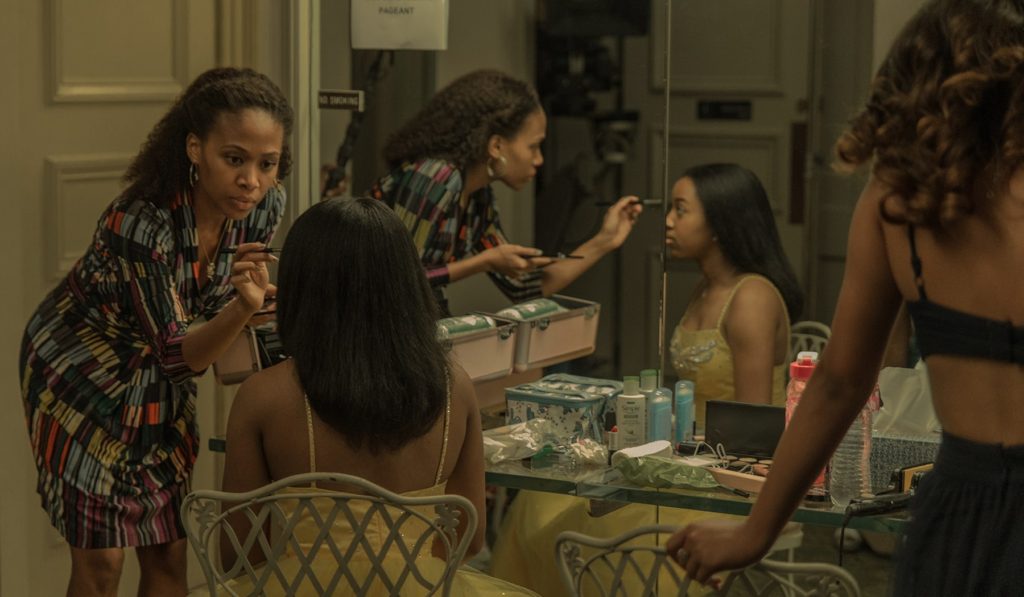Channing Godfrey Peoples is an MFA graduate of the USC School of Cinematic Arts and one of Filmmaker magazine’s 2018 “25 new faces of independent film.” She wrote two episodes of “Queen Sugar’s” third season. She is an Austin Film Society fellow and a San Francisco International Film Festival Westridge Grant recipient. “Miss Juneteenth” is her feature directorial debut.
“Miss Juneteenth” premiered at the 2020 Sundance Film Festival on January 24.
W&H: Describe the film for us in your own words.
CGP: My film is about Turquoise, a woman who won a college scholarship in the Miss Juneteenth pageant, a scholastic beauty pageant for African-American women back in the day. The pageant is the centerpiece of the Juneteenth celebration that commemorates the day slavery was abolished in Texas.
For Turquoise, life didn’t turn out like expected and today she is serving beers at a local juke joint while trying to figure out a way to create a better life for her teenage daughter, Kai. She enrolls her reluctant daughter in the Miss Juneteenth pageant in hopes of gaining that scholarship, despite Kai wanting something else.
W&H: What drew you to this story?
CGP: I grew up going to the Miss Juneteenth pageant and always felt inspired by seeing those beautiful young African-American women on stage. It was part of the fabric of my childhood.
I also grew up in the same tight-knit Texas community in which the film is set. It is in that community that women like Turquoise live who are hardworking, loving, and driven. Those are the women that inspired this story.
W&H: What do you want people to think about when they are leaving the theater?
CGP: I’d love for people to experience a world not often seen on screen. I’d love for people to see Turquoise’s strength and determination borne out of her love for her daughter and ultimately herself. I’d love for an audience to find some joy in this film.
W&H: What was the biggest challenge in making the film?
CGP: My biggest challenge moving from script to production was maintaining the authenticity of the writing, while being flexible with limitations that can crop up during production. As a writer, I find that anything is possible with words, but when the reality of production hits, you sometimes have to fight to maintain the magic of the script and that original vision.
I was lucky to have a strong production team of creatives that supported that vision.
W&H: How did you get your film funded? Share some insights into how you got the film made.
CGP: What got my film off the ground was the support of grant programs and artist development programs such as the Sundance Institute, San Francisco Film, and Austin Film Society. They nurtured the story, gave notes, and gave me the encouragement to keep pushing it forward.
“Miss Juneteenth” was independently financed.
W&H: What inspired you to become a filmmaker?
CGP: I was inspired by reading literary greats like Toni Morrison, Alice Walker, Gloria Naylor, and Maya Angelou. While reading their words, I was able to visualize their stories in my head.
I was also raised in community theater, so early on I saw the power of stories firsthand and the impact it can have on people.
W&H: What’s the best and worst advice you’ve received?
CGP: The best advice I’ve received is to keep going and the worst advice I’ve received is to give up.
I love to dream and my film being made is one of my dreams come true.
W&H: What advice do you have for other female directors?
CGP: Be true to your own voice and stay connected to the uniqueness of your story. Stories throughout generations have not changed drastically as a whole — it is the perspective of these stories that make them special. Your point of view is what makes a film distinctive.
W&H: Name your favorite woman-directed film and why.
CGP: There are so many films that I love that are directed by women, but one of my favorites is Julie Dash’s “Daughters of the Dust.” I was inspired by her ability to open the door to a new world and showing the authenticity of that world. I love that her characters reflect real people navigating life. Those are the kind of stories that resonate with me.
W&H: What differences have you noticed in the industry since the #MeToo and #TimesUp movements launched?
CGP: I am just coming up in my career in this industry, but my hope is that me and other women getting our stories to screen is a testament to positive changes in the industry and a continued trend. I am grateful to be here and hope to continue to see even more female perspectives and other marginalized points of view on the big screen. We need more stories about women. Women directors are deserving.







